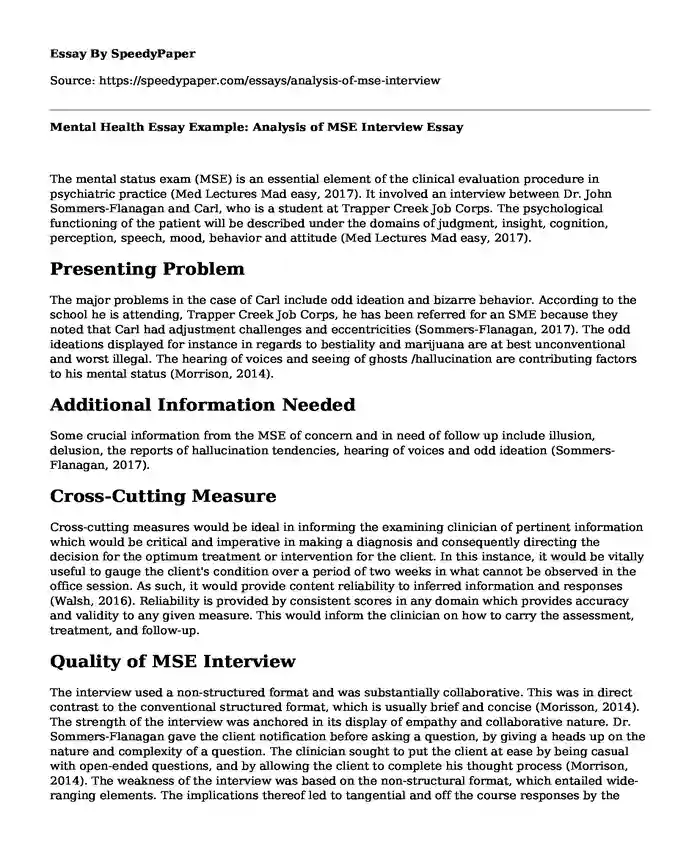
| Type of paper: | Essay |
| Categories: | Mental health |
| Pages: | 4 |
| Wordcount: | 846 words |
The mental status exam (MSE) is an essential element of the clinical evaluation procedure in psychiatric practice (Med Lectures Mad easy, 2017). It involved an interview between Dr. John Sommers-Flanagan and Carl, who is a student at Trapper Creek Job Corps. The psychological functioning of the patient will be described under the domains of judgment, insight, cognition, perception, speech, mood, behavior and attitude (Med Lectures Mad easy, 2017).
Presenting Problem
The major problems in the case of Carl include odd ideation and bizarre behavior. According to the school he is attending, Trapper Creek Job Corps, he has been referred for an SME because they noted that Carl had adjustment challenges and eccentricities (Sommers-Flanagan, 2017). The odd ideations displayed for instance in regards to bestiality and marijuana are at best unconventional and worst illegal. The hearing of voices and seeing of ghosts /hallucination are contributing factors to his mental status (Morrison, 2014).
Additional Information Needed
Some crucial information from the MSE of concern and in need of follow up include illusion, delusion, the reports of hallucination tendencies, hearing of voices and odd ideation (Sommers-Flanagan, 2017).
Cross-Cutting Measure
Cross-cutting measures would be ideal in informing the examining clinician of pertinent information which would be critical and imperative in making a diagnosis and consequently directing the decision for the optimum treatment or intervention for the client. In this instance, it would be vitally useful to gauge the client's condition over a period of two weeks in what cannot be observed in the office session. As such, it would provide content reliability to inferred information and responses (Walsh, 2016). Reliability is provided by consistent scores in any domain which provides accuracy and validity to any given measure. This would inform the clinician on how to carry the assessment, treatment, and follow-up.
Quality of MSE Interview
The interview used a non-structured format and was substantially collaborative. This was in direct contrast to the conventional structured format, which is usually brief and concise (Morisson, 2014). The strength of the interview was anchored in its display of empathy and collaborative nature. Dr. Sommers-Flanagan gave the client notification before asking a question, by giving a heads up on the nature and complexity of a question. The clinician sought to put the client at ease by being casual with open-ended questions, and by allowing the client to complete his thought process (Morrison, 2014). The weakness of the interview was based on the non-structural format, which entailed wide-ranging elements. The implications thereof led to tangential and off the course responses by the client.
On the other hand, it created an atmosphere where the client felt comfortable enough to respond candidly and divulge extra, albeit pertinent information. Additionally, the client felt at ease enough to make humor (Morrison, 2014). It built a rapport of trust between psychiatrist and patient. The responses from Carl were helpful pointers to diagnose Carl, although further follow-up would be a prudent measure for a conclusive answer to the mental status of the client. This was due to the spontaneous content provided in the course of the interview, which would not have been inferred or observed by the client (Morrison, 2014).
Response to Carl
I would discuss the results from the SME later, rather than now with Carl. As such, I would recommend a follow-up session. The rationale for this decision is because I believe the client would not be in a position to accept any assessment results at present. He perceives himself to be fine, and better than his "average" colleagues at Trapper Creek Job Corp. This self-perception would probably cause him to become defensive (or go into denial) is portrayed in a negative light (Morrison, 2014).
The response to Carl would be that the SME suggests that he is experiencing some symptoms of concern, which are usually associated with schizophrenia. These include hallucination (seeing ghost and hearing voices) and delusional tendencies, which inevitably contribute to adjustment problems, odd ideations and bizarre tendencies (American Psychiatric Association, 2013; Morrison, 2014; Walsh, 2016). The concern I have with Carl, as gleaned from his spontaneous content and unusual beliefs is that they are unconventional and could subsequently influence his behavior and contribute to deviant inclinations that could be harmful to self or others. For this reasons, there is a need for follow up and intervention measures.
References
American Psychiatric Association. (2013j). Neurodevelopmental disorders. In the Diagnostic and statistical manual of mental disorders (5th ed.). Arlington, VA: Author. doi:10.1176/appi.books.9780890425596.dsm01
American Psychiatric Association. (2013l). Other conditions that may be a focus of clinical attention. Diagnostic and statistical manual of mental disorders (5th ed.). Arlington, VA: Author. doi:10.1176/appi.books.9780890425596.VandZcodes
MedLecturesMadeEaSy.(May 29, 2017).Mental status exam. Retrieved from https://www.youtube.com/watch?v=RdmG739KFF8&feature=youtu.be
Morrison, J. (2014). Diagnosis made easier (2nd ed.). New York, NY: Guilford Press. Part 1, "The Basics of Diagnosis" (pp. 3-56)
Walsh, J. (2016). The utility of the DSM-5 Z-codes for clinical social work diagnosis. Journal of Human Behavior in the Social Environment, 26(2), 149-153. doi:10.1080/10911359.2015.1052913
Sommers-Flanagan, J. &Sommers-Flanagan, R.(nd).Clinical Interviewing: Intake, Assessment & Therapeutic Alliance. Retrieved from http://www.psychotherapy.net.ezp.waldenulibrary.org/stream/waldenu/video?vid=276
Cite this page
Mental Health Essay Example: Analysis of MSE Interview. (2022, Jul 25). Retrieved from https://speedypaper.net/essays/analysis-of-mse-interview
Request Removal
If you are the original author of this essay and no longer wish to have it published on the SpeedyPaper website, please click below to request its removal:
- Law Essay Example: Juvenile Incarceration
- Free Essay Example on Healthcare and Nursing Practice
- Taking of Parental Life Support, Free Essay with Discussion Response
- Free Essay Describing Social Media Impact
- Free Essay Sample: Artificial Intelligence in the Modern World
- Paper Example on The Return of Martin Guerre
- Pragmatist Decision Making. Free Essay
Popular categories




